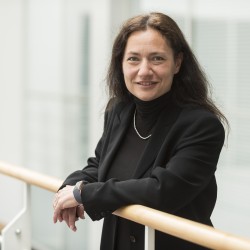World Space Week 2020 at Surrey: Meet Dr Raffaella Guida
‘Space detective’ Dr Raffaella Guida discusses asteroids, satellites and her out-of-this-world cooking.
What space research are you excited about at the moment?
I recently read about an interesting project aiming to understand more about asteroids. The idea is to place a radio tomography scanner on a satellite. This will fly around an asteroid and the device will use radio waves to scan its internal structure and properties.
What do we hope to learn from this?
Water particles might be hidden somewhere on asteroids or other celestial bodies. It won’t be on the surface as water evaporates if something is travelling through space at speed. But having the technology to look inside an object and find something like this is exciting.
Why is it exciting?
Scientists have always looked for traces of water in the Solar System, beyond Earth. If found, on an asteroid for example, it may suggest life has developed in the past or has the potential to develop in the future elsewhere in the universe. The water may be in a primordial phase, which may give us clues about how life originated on Earth.
Space exploration doesn’t always mean learning about space, we’re often using it to understand more about life as we know it on Earth.
What’s you role at Surrey Space Centre?
I teach remote sensing. This means I use satellite instrumentation to look into the atmosphere, the surface and beneath the surface of the Earth. My colleagues design, build and load instrumentation for satellites that have specialist sensors onboard. My job is to analyse the data that comes back once they’re in orbit.
I particularly like working with radar as it gives us the ability to penetrate cloud coverage and take an image of the Earth at night. With radar, issues of surveillance and security are not hampered by weather conditions. It’s a very empowering piece of technology. It allows us to extract and analyse data we wouldn’t otherwise have.
Essentially, you’re a space detective!
Yes, I’m a space detective! I assess the data and use it to solve problems or predict possible dangers.
For example, we use satellite data to track icebergs in the North and South Poles. Here, there are long periods of time without illumination. But there are maritime shipping routes, too, so large pieces of ice floating on the water can be a huge risk to commercial vessels. At night, visibility may not be great, so we can create real-time maps using satellite radar data to help avoid such collisions.
We can also use this technology for disaster management. So, if we have fires or flooding or earthquakes at night, there may be persistent cloud cover, which prevents visibility. The only way to monitor the area is to use satellite radar imaging. In those situations, the interpretation of the image and the extraction of the data can be a life-or-death matter.
How did you start in this?
I originally studied telecommunications engineering, then I studied remote sensing. But there are two main reasons why I continue to enjoy this work.
Firstly, the technology allows me to study in an area that benefits everyone.
Secondly, I fell in love with the idea of looking at the Earth from space. The image still amazes me and I get to look at it for a living.
How do you relax away from all things space?
I love gardening and being in nature. I often relax by playing Lego with my kids. I’m Italian, so I love cooking. My pizza dough recipe is out of this world! My family were bakers and sailors, so travelling is an important part of my life, too.
Do you watch any space-based films or TV shows?
I enjoyed the movie First Man about Neil Armstrong and the Apollo 11 mission. What we don’t understand today is the huge risks astronauts took when they first went into space. Watching this movie, you’re catapulted into the drama that they lived through and you see how it impacted on the family they left behind. We often just see the excitement around these things, but this film showed the difficulties faced by the people directly and indirectly involved.
Find out more about studying at Surrey Space Centre.




